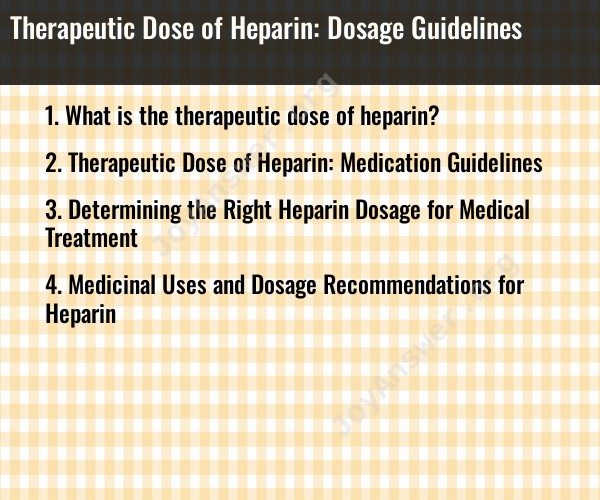What is the therapeutic dose of heparin?
The therapeutic dose of heparin, an anticoagulant (blood thinner), can vary depending on the patient's specific medical condition and needs. It is typically administered to prevent or treat blood clots, such as deep vein thrombosis (DVT), pulmonary embolism, or during certain surgical procedures to prevent clot formation. The dosage is usually determined by a healthcare provider based on several factors, including the patient's weight, medical condition, and the desired level of anticoagulation.
Heparin is often given in units per kilogram of body weight per hour (units/kg/hour) as a continuous intravenous (IV) infusion. The initial dose and subsequent adjustments are typically made to achieve a target level of anticoagulation, usually measured as activated partial thromboplastin time (aPTT) or partial thromboplastin time (PTT).
The therapeutic range for aPTT or PTT can vary depending on the clinical situation, but it often falls within 1.5 to 2.5 times the patient's baseline value. This means that the heparin dosage may need to be adjusted to keep the patient's aPTT or PTT within this range, which is considered therapeutic for preventing and treating blood clots.
It's crucial to note that heparin therapy should be closely monitored and adjusted by healthcare professionals, and the specific dosage can vary widely based on the patient's individual needs and response to treatment. Self-administration or self-dosage of heparin is not recommended due to the risk of complications, and it should only be used under the guidance of a qualified medical practitioner.
If you or someone you know is prescribed heparin, it is essential to follow the healthcare provider's instructions carefully and attend regular check-ups to ensure that the therapy remains safe and effective. The therapeutic dose will be determined and adjusted based on the specific medical condition and response to treatment.
Therapeutic Dose of Heparin: Medication Guidelines
Heparin is a blood thinner that is used to treat and prevent blood clots. It is also used to prevent blood clots from forming during surgery and other medical procedures.
The therapeutic dose of heparin depends on the reason why it is being used. For example, the dose of heparin used to treat deep vein thrombosis (DVT) is different from the dose used to prevent blood clots during surgery.
Heparin is typically administered intravenously (IV) or subcutaneously (SQ). The IV dose of heparin is usually started at 5,000 units and then adjusted based on the patient's response. The SQ dose of heparin is usually started at 80 units/kg and then adjusted based on the patient's response.
Determining the Right Heparin Dosage for Medical Treatment
The right heparin dosage for medical treatment depends on a number of factors, including:
- The reason why heparin is being used
- The patient's age
- The patient's weight
- The patient's kidney function
- The patient's other medical conditions
It is important to monitor the patient's response to heparin closely and adjust the dose as needed.
Medicinal Uses and Dosage Recommendations for Heparin
Heparin is used to treat and prevent a variety of blood clots, including:
- Deep vein thrombosis (DVT)
- Pulmonary embolism (PE)
- Stroke
- Heart attack
- Unstable angina
- Atrial fibrillation
- Venous thromboembolism (VTE)
The specific dosage of heparin used will vary depending on the reason why it is being used.
Dosage Recommendations for Heparin
The following are some general dosage recommendations for heparin:
- DVT: 80 units/kg SQ every 12 hours
- PE: 80 units/kg SQ every 12 hours or 18 units/kg/hour IV
- Stroke: 80 units/kg SQ every 12 hours or 18 units/kg/hour IV
- Heart attack: 80 units/kg SQ every 12 hours or 18 units/kg/hour IV
- Unstable angina: 80 units/kg SQ every 12 hours or 18 units/kg/hour IV
- Atrial fibrillation: 80 units/kg SQ every 12 hours or 18 units/kg/hour IV
- VTE: 80 units/kg SQ every 12 hours or 18 units/kg/hour IV
It is important to note that these are just general dosage recommendations. The specific dosage of heparin used will vary depending on the patient's individual needs.
Conclusion
Heparin is a blood thinner that is used to treat and prevent blood clots. The therapeutic dose of heparin depends on the reason why it is being used and the patient's individual needs. It is important to monitor the patient's response to heparin closely and adjust the dose as needed.












